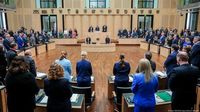Germany's upper house of parliament, the Bundesrat, made a historic move on March 21, 2025, approving a €1 trillion spending package intended to bolster defense, infrastructure, and climate initiatives. This marked a significant departure from the country's long-standing fiscal conservatism, aimed at revitalizing Europe's largest economy and enhancing its military readiness amidst growing geopolitical concerns.
Following the overwhelming passage of constitutional amendments earlier in the week, the Bundesrat's approval signaled the last hurdle for a transformative fiscal plan. The legislation includes setting up a €500 billion fund specifically earmarked for infrastructure projects and allowing defense expenditure to be exempt from Germany's long-standing debt limits. The move is driven by a need to adapt to an evolving global landscape, particularly in light of perceived threats from Russia.
Chancellor-in-waiting Friedrich Merz and the other parties involved in this initiative have expressed a sense of urgency regarding the modernizing of Germany's military capabilities. "My absolute priority will be to strengthen Europe as quickly as possible so that, step by step, we can really achieve independence from the USA … I have absolutely no illusions about what is happening from America," Merz stated, highlighting the desire to bolster military infrastructure amid uncertainty surrounding U.S. military commitments under President Donald Trump.
The Bundesrat's approval follows a successful push through the Bundestag, Germany's lower house, on March 18, where the plan received backing from both the Social Democrats and the Greens. The proposed reforms come as the nation recognizes the imperative need for enhanced military defenses and modernization, especially following Russia's aggressive posture in Eastern Europe.
(Ironically, while previous Bundeswehr practices have often been criticized for outdated equipment and lack of funding, the recent developments suggest a shift in governmental funding priorities.) Now, as part of the reformation of its debt rules, the new plan allows for the pending addition of about 100 billion euros specifically for defense, aimed at meeting NATO's requirement of spending two percent of GDP.
Moreover, the initiative is expected to pour substantial investments into Germany's crumbling infrastructure. According to the transport ministry, the nation needs to address significant shortfalls, including the rebuilding of around 5,000 bridges, much of which dates back to the 1960s and 1970s. "We have a lot of infrastructure that dates back to the 1960s and 1970s," a spokesperson from the ministry stated, reflecting the urgency of modernizing this part of the economy.
The commitment by Germany to invest heavily in both military and infrastructure development comes as part of broader goals to revive an economy that has faced challenges over the past few years. Experts express cautious optimism that these outlays may help kickstart economic growth, enhancing the prospects for recovery not only in Germany but across the eurozone. However, there are also warnings that merely increasing spending won’t suffice without structural reforms that can further lower energy costs and attract skilled labor.
Further complicating matters for Merz and the CDU are the political implications of such extensive spending. Having campaigned on a promise to maintain fiscal discipline, he is facing criticism for initiating what has been termed a tectonic shift in policy almost immediately after winning the elections. Critics, including some voters, allege voter fraud, expressing dissatisfaction about the swift pivot toward debt spending.
"The threat from the East, from Moscow, is still present," noted Bavarian Premier Markus Soeder, indicating a substantial concern over Germany's security landscape given the changing dynamics of international relations. "The support from the West is no longer what we were once accustomed to," he continued, emphasizing the reality prompting these budgetary decisions.
The spending plan marks the end of decades of fiscal conservatism in Germany. While it signals a readiness to engage in significant public investment, analysts suggest that without accompanying efforts to streamline government efficiency and reduce bureaucratic barriers, this could be a momentary flash of growth rather than a sustainable economic turnaround. "Modern infrastructure is essential for one of the world's largest economies, but it doesn't inherently drive innovation or sector transformation," expressed ING analyst Carsten Brzeski.
As Merz navigates through coalition discussions with the SPD, aiming to finalize agreements by Easter, the nation's financial commitments will undoubtedly have lasting ramifications. Will Germany, previously renowned for its fiscal restraint, become a significant player in the realm of unrestricted government investment? Only time will tell, as the nation embarks on this uncharted journey in its fiscal policy landscape.
The medida of the reforms may reshape how the nation approaches both its defense and domestic growth strategies as it contemplates future relationships and dependencies within the global arena, especially those concerning transatlantic ties.



